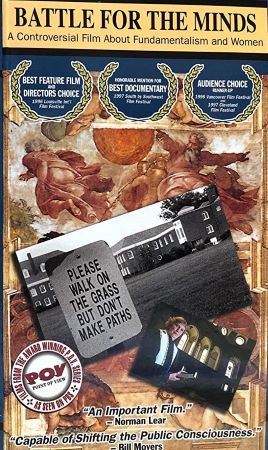
Battle for the Minds 1997
Distributed by Battle for the Minds, Inc. through New Day Films, 22 D Hollywood Ave, Hohokus NJ 07423; 888-367-9154
Produced by Stephen Lipscomb
Directed by Stephen Lipscomb
VHS, color and b&, 75 min.
College - Adult
Religious Studies, Political Science, Sociology, Women's Studies
Date Entered: 11/09/2018
Reviewed by Scott Smith, Lorette Wilmot Library, Nazareth College, Rochester, NYThis program centers around 1995’s forced resignation of Dr. Molly Marshall, Professor of Theology, from Southern Seminary -- a resignation seemingly demanded by the increasingly conservative outlook, particularly in terms of the role of women as pastors in Southern Baptist churches, of the national leadership of the Southern Baptist Convention (SBC). The documentary intercuts footage of events surrounding Dr. Marshall's removal with interviews and background footage that provide explanation and context. The interview segments are particularly effective in providing succinct portrayals of both the objective and the subjective sides of the dismissal. Individual speakers come across as either earnest or smug, serious and well-meaning or manipulative and destructive, depending upon one's point of view. For example:
"I personally think that it has been somewhat deceptive and misleading for Southern Seminary to invite women to come there and receive theological training under the delusion that they're going to be able to serve as pastors in Southern Baptist churches. It ain't going to happen." Rev. David Miller, Vice-Chair of the Board of Trustees of Southern Seminary."The Bible is crystal clear, that in the church of God, that women are not to have the position of ruling and teaching over men." Dr. Paige Patterson, president of Southeastern Seminary, another of the seminaries affiliated with the Southern Baptist Convention.
Other speakers attempt to debunk the moral, ethical, and scriptural foundation of statements made by the speakers quoted above and their allies, saying that they pick and choose their scripture, often taking quotations out of context, and rely on poor translations. (In one humorous moment, Dr. Charles Hawkins, Professor of Christian Philosophy, recounts that, when confronted with the belief that women pastors are inappropriate due to Eve's responsibility for the fall from grace, one scholar responded, "That's a long time to hold a grudge.")
And so it could go, on and on, spinning away forever. But, this documentary operates on several different, although interrelated, levels, each one providing a reflection of the level above it. The ouster of Dr. Marshall is placed in the larger context of the end of independent, scholarly inquiry at Southern Seminary, once thought of as "the grand jewel, the mother seminary" of the SBC.
The transformation of Southern Seminary is placed in the larger context of the takeover of the SBC by fundamentalist activists which began in the late 1970s. The fundamentalists succeeded not only in capturing and maintaining the presidency of the SBC, but also in fully utilizing the appointive powers of that office to develop a national SBC leadership with the authority to quash the traditional local autonomy of individual churches and impose their own conservative views on scripture and doctrine.
The takeover of the SBC leadership and the ending of the local autonomy of SBC churches is placed in the larger context of the transformation of the SBC into a conservative, if not reactionary, political force. The influence that a highly politicized SBC could wield is noted by Dr. Paul Simmons, Professor of Christian Ethics, who says "The Southern Baptist Convention is the single largest Protestant denomination in the United States. It numbers nearly four thousand churches ... [who have] nearly fifteen million members...if the leaders could get everybody to cooperate with and agree with the radical right agenda, that is a powerful voting bloc and becomes terribly influential to any Congressperson or person in government." And the transformation of the SBC into a political force is put into the larger context of the power of fundamentalism as a movement in modern society. As R. Gene Puckett, Editor of the Biblical Recorder, says "I contend that fundamentalism is not a religion, it's a mindset, it's a world-view, it's a lifestyle, and you can apply it to economics, you can apply it to politics, you can apply it to religion, and we're seeing that happen. The Southern Baptist Convention is a microcosm of the fundamentalist technique agenda imposed on a religious body in the United States."
Other than some instances of muddy sound in some of the non-interview footage, the technical quality of the documentary is excellent. The overall quality of the presentation and editing was high, with the exception of one minor quibble -- the juxtaposition of color and black and white videography in the interviews seemed arbitrary and distracting. Battle for the Minds is a thoughtful and thought provoking examination of many of the social forces at work in today's society and is appropriate for all general collections and in support of curriculum dealing with religion and theology, political science, women's studies, and sociology. Highly recommended.